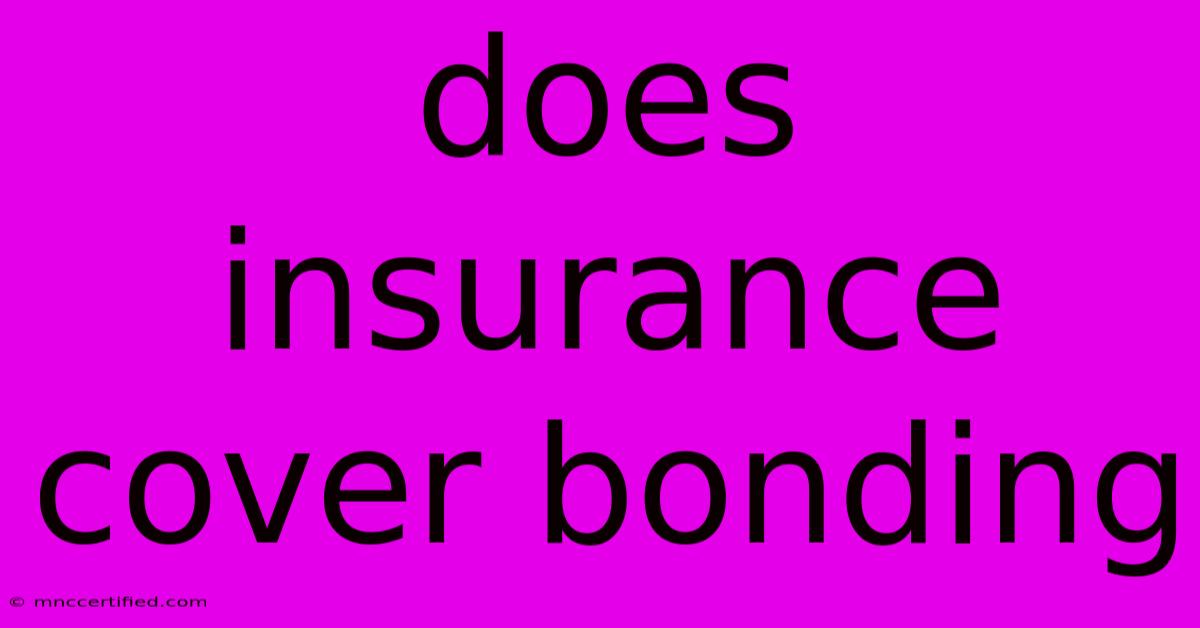Does Insurance Cover Bonding

Table of Contents
Does Insurance Cover Bonding? Unraveling the Complexities
Surety bonds and insurance policies, while both involving risk transfer and financial protection, are fundamentally different. The question, "Does insurance cover bonding?" is therefore complex and doesn't have a simple yes or no answer. Let's delve into the intricacies to understand the relationship between insurance and surety bonds.
Understanding Surety Bonds: A Crucial Distinction
Before exploring insurance coverage, it's vital to grasp the nature of surety bonds. A surety bond is a three-party agreement involving:
- The Principal: The individual or business needing the bond.
- The Obligee: The party requiring the bond (e.g., a government agency, client, or licensing board).
- The Surety: The insurance company or bonding agency guaranteeing the principal's performance.
Unlike insurance, which protects against potential losses, a surety bond guarantees the performance of a specific obligation. If the principal fails to fulfill their contractual obligations, the surety steps in to cover the losses incurred by the obligee. This is a critical difference. Insurance protects you; surety bonds protect others from you.
Types of Bonds and Their Relationship to Insurance
Various types of surety bonds exist, each serving a distinct purpose. Examples include:
- Contract Bonds: Guarantee the completion of a construction project or other contract.
- License and Permit Bonds: Required by various licensing boards to ensure compliance with regulations.
- Fidelity Bonds: Protect against employee dishonesty or theft.
- Court Bonds: Used in legal proceedings, such as bail bonds or probate bonds.
While insurance might cover certain indirect losses related to a surety bond, it won't directly pay for the bond itself or cover the principal's failure to perform. For example, if a contractor fails to complete a project (resulting in a claim against their contract bond), their general liability insurance might cover resulting damages to a third party, but it won't cover the contractor's breach of contract.
How Insurance Can Indirectly Relate to Bonding
Here's where the lines blur slightly:
- Business Owner's Policies (BOP): A BOP might include some coverage for legal liabilities that could indirectly relate to bond requirements. However, this is often limited and doesn't replace the need for a separate surety bond.
- Errors and Omissions Insurance (E&O): If a professional makes a mistake that necessitates a bond claim, E&O insurance could potentially cover some of the resulting damages. Again, this doesn't directly cover the bond obligation itself.
Crucially, insurance policies do not replace surety bonds. They address different risks. Trying to substitute one for the other can leave you financially exposed.
The Bottom Line: No Direct Coverage
To reiterate, insurance typically does not cover surety bonds directly. They serve distinct purposes and are designed to address different types of risk. Obtaining the necessary surety bond is a separate requirement, irrespective of any existing insurance coverage. Always consult with a qualified insurance broker or surety bond provider to determine the specific bonds and insurance coverage needed for your situation. Failing to understand this distinction could have serious financial consequences.
Keyword Optimization: A Note for SEO
This article naturally incorporates keywords like "insurance cover bonding," "surety bonds," "insurance policies," "bond requirements," and related terms. The strategic placement of keywords throughout the text enhances search engine optimization without sacrificing readability or natural language flow. Further off-page SEO strategies, such as building high-quality backlinks from reputable sources, would further enhance the article's ranking potential.

Thank you for visiting our website wich cover about Does Insurance Cover Bonding. We hope the information provided has been useful to you. Feel free to contact us if you have any questions or need further assistance. See you next time and dont miss to bookmark.
Featured Posts
-
Apple Air Pods Max Black Friday Sale Usb C
Nov 30, 2024
-
Osu Vs Boise State Tv Schedule And Time
Nov 30, 2024
-
Glossier Brow Flick My Multipurpose Pencil
Nov 30, 2024
-
Hunter Stat Inflation Colorado Faces Accusations
Nov 30, 2024
-
Do You Have To Pay A Pr Bond
Nov 30, 2024